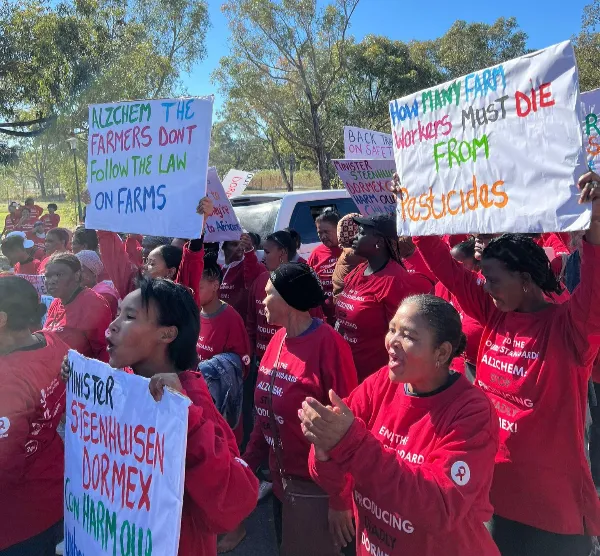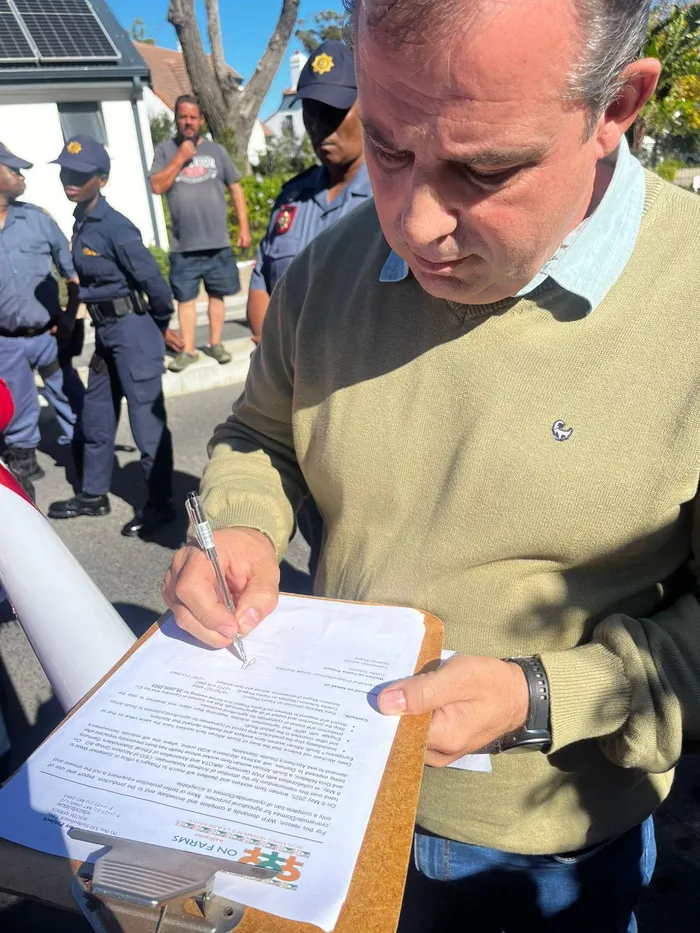
Farmworkers Women farm workers and dwellers march to Philagro’s office in Somerset West to hand over a memorandum demanding a complete and immediate end to the production, export and use of cyanamide/Dormex for agricultural purposes amid serious health concerns.
Image: Supplied
AGRICULTURE Minister John Steenhuisen has yet to disclose how his office would deal with increasing calls for a complete and immediate end to the production, export and use of cyanamide/Dormex for agricultural purposes, amid serious health risks to farmworkers.
Cyanamide, a Highly Hazardous Pesticide (HHP), according to Women on Farms Project (WFP) had lost its approval in the European Union since 2008, but is still produced by Alzchem in Germany from where it is exported to countries in the global South, including South Africa.
In South Africa, cyanamide is distributed by Philagro on behalf of Alzchem, according to WFP.

A memorandum by Women on Farms project is accepted by Schalk Reynolds from Philagro.
Image: Supplied
Scores of women farm workers and dwellers recently marched to Philagro’s office in Somerset West to hand over a memorandum for the attention of Alzchem Group AG, to highlight their concerns.
“In 2019, WFP, a feminist South African non-governmental organisation, undertook a desk-top study which found that 67 pesticides that are already banned in Europe are still exported to and used in South Africa. Since the launch of its Double Standards campaign, WFP has been lobbying the South African government to ban these pesticides, while also demanding that European companies like Alzchem stop the production and export of pesticides that have been banned in the European Union because they are so harmful to human health.
"Farmwomen have stated that it is unjust that farm workers in South Africa, the majority of whom are women, are exposed to pesticides that have been banned in Europe," said WFP.
WFP lamented that many farm women were exposed to Dormex/cyanamide without proper training, no proper protective equipment, were also not guaranteed water to wash their hands or even a toilet to relieve themselves while working.
“The European Food and Safety Authority (2010) found that even when proper protective equipment, masks, gloves, visors, hoods and rubber boots are used; operator exposure estimates exceeded acceptable levels by 6433%. The situation in South Africa is particularly dire as there is widespread non-compliance with the South African occupational health and safety legislation and a persistent lack of effective enforcement by labour inspectors,” the organisation added.
They want a formal meeting with Alzchem to discuss their concerns.
While their memorandum was received by Schalk Reynolds from Philagro, he did not respond to further requests for comment by deadline.
Alzchem did not respond to questions on their response to WFP’s calls.
Steenhuisen’s spokesperson, Joylene van Wyk said they would respond to the memorandum in due course.
Cape Times